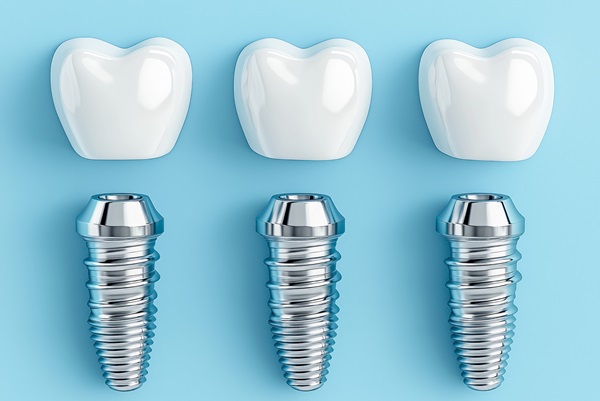Am I a Candidate for Implant Restoration?

Missing teeth can impact the appearance of the smile and make it difficult to speak, chew, and eat. Dental implant restoration is a method of replacing missing teeth that can improve the appearance of a patient's smile and restore the function of the teeth.
Implant restoration
Implant restoration involves surgically placing artificial tooth roots into the jaw of a patient. The artificial roots are constructed from titanium and resemble screws. Artificial teeth are attached to the posts to replace the look and function of missing teeth.
Who is a candidate?
You may be a candidate for implant restoration if you meet these criteria:
- Have one or more missing teeth
- Want to improve your ability to speak
- Can not or do not want to wear dentures
- Have a fully grown jawbone
- Enough bone to secure the implants or can have a bone graft performed
- Have healthy oral tissues
- Do not smoke or are willing to quit
- Willing to commit several months
What are the benefits?
Traditional dentures or bridges used to replace missing teeth do not replace the tooth roots. Without the tooth roots to stimulate the jawbone, many patients lose bone mass which can change the shape of the patient's face, cause dental work to fit improperly, and interfere with chewing and speaking.
Dentures that do not fit properly can slide in the mouth making it difficult to speak and chew. Implants fuse with the jawbone, making them permanent. An implant restoration will not slide around in the mouth as traditional dentures may and does not require the use of adhesives to keep the restoration in place.
The durable material does not decay the way the natural teeth that support bridges and dentures may, and the implant procedure does not require altering the remaining natural teeth the way a tooth-supported bridge sometimes does. Many patients find implants to be more comfortable than removable dentures, and an implant restoration does not need to be removed for cleaning.
How long does the procedure take?
Implant restoration is a multi-step process that requires several months for most patients. The majority of this time is spent waiting for the jawbone to fuse to the implant as it heals. This usually takes six to 12 weeks. The process may take longer for patients who require a bone graft to prepare the jaw for implants.
What are the risks?
Rarely, implant restoration surgery may result in an infection at the implant site. It may also injure or damage teeth, blood vessels, or other tissue near the surgical site, cause nerve damage, or create sinus problems. When these complications occur, they are usually treatable.
Conclusion
Most patients who have missing teeth are candidates for implant restoration if they have sufficient bone mass to anchor an implant and do not have other complicating health issues. However, the process can take several months to complete, so patients seeking faster restoration methods may want to consider alternatives.
Request an appointment here: https://bergenerdental.com or call Hackensack Emergency Dental and Implant Center at (201) 620-9644 for an appointment in our Hackensack office.
Check out what others are saying about our dental services on Yelp: Dental Implants in Hackensack, NJ.
Related Posts
A dental implant crown is an artificial tooth that connects to the embedded post in the patient's jaw by means of an abutment. The crown is the visible part of the three-piece implant used to replace a missing tooth through a surgical procedure. The dental crowns used with implants are usually made of porcelain but…
Dental implants are one of the options you get to choose from if you are missing one or more teeth. A growing number of people are opting for implants thanks to the convenience that comes with them and their bone tissue preserving properties. Dental implants are rods/screws that are inserted into the jawbone to serve…
A dental implant restoration is often recommended by dentists for patients with one or multiple missing teeth that want the most natural-like and long-term solution for teeth replacement. This review discusses dental implant restoration in detail, highlighting what it is, the benefits, disadvantages, and when to consider treatment.Our goal is to help patients make informed…
You may have heard of dental bridges as a type of restorative treatment at the dentist’s office. It is one of the various options the dentist can explore to restore smiles and the full function of the mouth. As you consider this treatment along with other possible solutions, it is helpful to understand how bridges…
